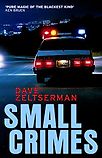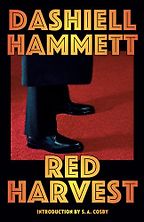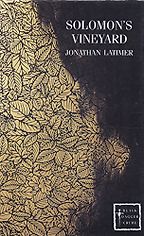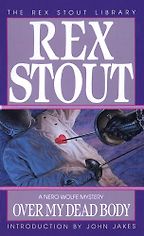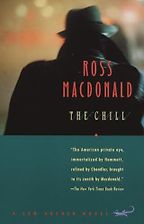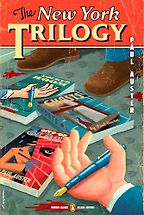Thank you for agreeing to talk to us about American detective novels. Is there anything you would say marks the US approach apart?
The American approach to the detective novel is more cynical, more violent. Well, there can be plenty of violence in British detective novels, as Derek Raymond shows, but as a rule—it’s more hard-boiled.
What does ‘hard-boiled’ mean to you?
It means tough, jaded. Something like that. And there will be a toughness in what happens in the plot. A PI, private investigator, will get beaten by the mobsters, pick himself up and doggedly keep going.
You’ve selected books with a wide chronological spread across the 20th century. Would you say you have a preferred period?
The books on my list range from Red Harvest, originally serialised in 1927, 1928, to Paul Auster’s postmodern New York Trilogy, which was published in the 1980s. That’s a very different kind of book to the usual mysteries.
I’d say a lot of the detective fiction I like to read dates from the 1930s to the 1950s.
Well, let’s start with Dashiell Hammett’s Red Harvest. As you say, it began life as a serial, and was published in book form in 1929. Would you introduce us?
Red Harvest is one of two serialised novels featuring the Continental Op. Hammett wrote 24 Op stories and two novels, Red Harvest and The Dain Curse. The Op is a nameless PI who works for a Pinkerton-type agency called the Continental Detective Agency. He’s a short, stocky, middle-aged, balding guy who is just very dogged in his pursuit of the answers. He will do some pretty morally ambiguous stuff to get the job done.
One of the great lines in any detective short story is from Hammett’s ‘The Gutting of Couffignal,’ in which the Op has been sent to guard the gifts of a very wealthy family during a wedding that is taking place on an island. A gang of criminals are trying to rob the wedding. The Op hurts his leg and, hobbling around, sees a guy on crutches, calls him over, takes one of the crutches and sends him to the ground. At the end of that story, he discovers the mastermind of this business is a beautiful woman. As she’s walking away, he shouts, ‘Stop or I’ll shoot!’ She doesn’t believe him, but he shoots her in the calf. He says: ‘You ought to have known I’d do it! Didn’t I steal a crutch from a cripple?’
That kind of sums up the Op. In Red Harvest, he does far worse. He is brought into this town called Personville, which he calls ‘Poisonville.’ There are lots of different criminal elements working there. The Op is sent to meet with the one honest person in this town—the newspaper publisher—who is then killed. Then he’s hired by the newspaper publisher’s father, the wealthiest guy in town, to find out who killed his son.
He figures that out pretty quickly, but decides that’s not enough. He wants to clean up this town. He’ll do whatever it takes to flush out all the criminal activity, hitting one gang after another, manipulating them to kill each other, which is how you get the title. There are lots of deaths in Red Harvest.
Got it. Shall we look at Solomon’s Vineyard? This is a 1941 novel from Jonathan Latimer. I’ve seen it described as “pure pulp.”
This is a great novel. A wild novel. It’s a little like Red Harvest in that it has some similar properties: a detective is coming to town to clean it up.
The book was originally published in the UK because it was too risky for the US. It came out in 1941 in the UK, but wasn’t published in its original form here until the 1980s.
It begins with the narrator introducing the novel:
Listen. This is a wild one. Maybe the wildest yet. It’s got everything but an abortion and a tornado. I ain’t saying it’s true. Neither of us, brother, is asking you to believe it. You can lug it across to the rental library right now and tell the dame you want your goddamn nickel back. We don’t care. All HE done was write it down like I told it, and I don’t guarantee nothing.
That pretty much says what you need to know. It deals with a corrupt town, illegal activity, a perverse cult, a cesspool of criminality.
I don’t want to give too much away, because the pleasure of the book is in discovering what this cult is all about. But the set-up is that the cult leader, Solomon, died five years earlier, and every year his corpse is presented to a bride and the bride disappears. Craven discovers that the young woman he has been hired to find was picked to be this year’s bride. So there’s an urgency to it, to go in and rescue her.
It’s one of the wildest detective novels, but it holds up very well today.
In Solomon’s Vineyard, the detective assumes the name Karl Craven—great name—and he’s like if Hammett’s Op was mixed with Mickey Spillane’s famous detective Mike Hammer. He’s a much larger, beefier, but still morally ambiguous character who, during the course of the novel, does find out how far he’s willing to go.
Quite far, I’d hazard.
When he passes up a small fortune in cash and diamonds, he realizes he’s not willing to be a thief, but otherwise he will do anything to get the job done.
Interesting. This does feel like a key element of the American detective novel: these are private detectives, neither police nor hobbyists. They are professionals who get the job done, and they seem to function in a kind of legal grey area.
But then you have Raymond Chandler’s Marlowe, who is a white knight. He’s very different in that sense. And then you have Ed McBain’s 87th Precinct novels, which are technically police procedurals, following police methods.
So there is a range within American detective fiction, but I tend to focus on the PI fiction.
Got it. Shall we talk about Rex Stout’s Over My Dead Body (1940) next? It features a very exciting murder in a fencing studio.
The detective in this series is almost a pastiche of Sherlock Holmes, but what makes it so brilliant is that Rex Stout merged the classic British mystery with the American hard-boiled. Nero Wolfe is this eccentric, brilliant, genius detective who is always able to solve the crimes police can’t. His assistant Archie is the traditional hard-boiled PI—wise-cracking, always like one, two, steps behind. He does all the legwork. He’s the one who gets arrested, the one who gets beat up. He’s the one who is interested in women.
“The American approach to the detective novel is more cynical, more violent”
Their relationship is what makes the Nero Wolfe books so fun. I don’t know how many Nero Wolfe books were written—probably forty odd—but at one point I was just reading a new book every couple of days. It’s like getting together with friends. They are fantastic characters, especially in the early books, which are very clever.
Over My Dead Body has some foreign intrigue, it has blackmail and murders, a clever ending, and it introduces a little bit of Nero Wolfe’s background, his relationship with Montenegro. I could have picked maybe half a dozen Nero Wolfe books I like as much as Over My Dead Body, but this is a lot of fun.
It’s great to find a series that you love. It keeps giving and giving.
I’ll warn you that the first book in the series, Fer-de-Lance, is a little stiff. You have to push your way through it, because the relationship and the humour and everything that makes the series so great isn’t so evident in that first book. It takes probably until the third book to hit its stride.
Do you need to read them in order?
I read them in order. There are things that carry on from the earlier books into the later ones.
Let’s talk next about Ross Macdonald’s 1964 novel The Chill.
Ross Macdonald’s PI was Lew Archer. What Ross Macdonald did in these books was dig into suburban America. You have all these suburban families that look normal, but when you dig down you uncover sin and secrets that people want to keep covered up.
The Chill is probably his most chilling book. It’s just a book that I really enjoyed. The plot involves Archer being hired by a young man to find his missing wife who disappeared during their honeymoon, and that cascades into a series of murders, the first of which dates back twenty years. I think you could change the perspective and follow the person trying to keep his or her secrets buried. At one point I was considering contacting the Ross Macdonald estate to get permission to flip this around and write a noir version of The Chill from the point of view of the killer.
Lew Archer is more of an observer. He’s more of Chandler’s Marlowe, when it comes to morality.
And, as you mentioned earlier, your final book recommendation is quite different. Would you talk us through Paul Auster’s New York Trilogy?
Yes. This is not representative of any of the other detective novels that I’ve talked about. It’s a postmodern collection of novellas by Paul Auster, which focus on the whole idea of mystery and detection, identity and madness. It’s very, very interesting.
In the first, a writer gets a phone call from someone trying to call a detective. He takes on the job to follow someone, and as he follows this person through the city, he ends up losing himself completely. The second one is quite similar, in that you have a detective hired to follow someone over years. At some point he realises this person is also observing him—and, again, it dissolves into madness. The third falls along a similar line, but for someone like me, who has read a lot of detective fiction, it’s a lot of fun to read something so different.
That sounds great. I think fiction about secrets and lies has the potential to be very destabilising. I find that very exciting in a novel. How do you approach these themes in your own work?
I write a lot of different types of stuff, everything from crime fiction to horror, but the most obvious would be my series of short stories with my detective Julius Katz and his sidekick Archie, a little tie clip that Julius wears which is actually a sentient being in its own right with a highly advanced neural network. Archie is always trying to adapt his knowledge base and neural network so he can beat Julius to the punch in solving a crime, but he’s always a little bit behind. As in the Nero Wolfe books, my Archie narrates, and a lot of the fun is the relationship between the Archie and Julius.
My crime fiction tends to be on the hard-boiled side. Small Crimes is pure noir. I’d say it has that same toughness. If moral ambiguity gets to you, you don’t want to read Small Crimes.
Interview by Cal Flyn, Deputy Editor
November 20, 2025. Updated: December 3, 2025
Five Books aims to keep its book recommendations and interviews up to date. If you are the interviewee and would like to update your choice of books (or even just what you say about them) please email us at [email protected]
Five Books interviews are expensive to produce. If you've enjoyed this interview, please support us by donating a small amount.

